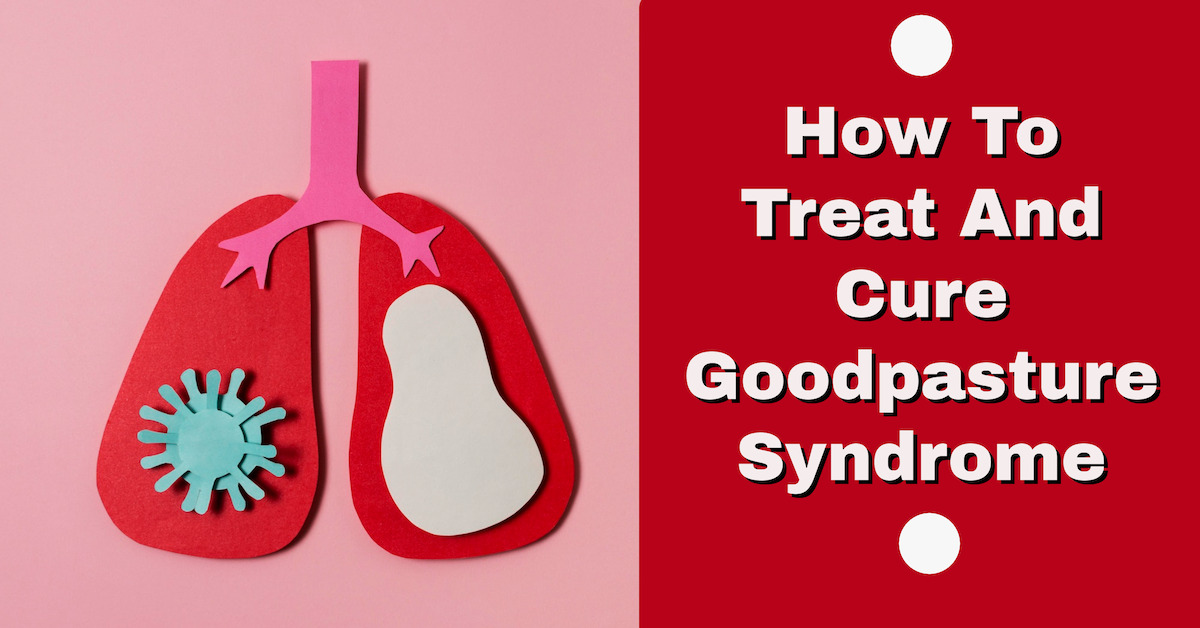How To Treat And Cure Goodpasture Syndrome

How To Treat And Cure Goodpasture Syndrome: Goodpasture syndrome is a serious autoimmune condition. It triggers the immune system to assault kidney and lung tissues. Coughing up blood and breathing issues are symptoms. EnoughInfo.com

If left untreated, the illness causes renal failure, lung damage, and death. Medication and a blood transfusion technique called plasmapheresis are used as treatments.
What is Goodpasture Syndrome?
Goodpasture syndrome, also known as anti-GBM illness, is a fatal autoimmune condition that affects the kidneys and the lungs. It takes place when the immune system unintentionally targets collagen protein because it perceives it as a foreign substance. In the course of the Goodpasture syndrome, the body creates proteins (antibodies) that bind to the collagen in specific regions of the kidneys and lungs. These antibodies induce significant tissue death and inflammation when they bind to the collagen.
Coughing up blood is one of the disease’s symptoms, along with respiratory problems, exhaustion, and anemia. Patients who have renal illness may have high blood pressure, leg edema, and blood in the urine. Patients who have very severe renal disease may discover that they are only peeing in modest amounts and may also experience nausea and vomiting. How Do You Treat And Cure Amyloidosis Naturally
If left untreated, Goodpasture syndrome can result in glomerulonephritis, an inflammation of the kidneys, and eventually irreversible kidney failure. The primary cause of mortality from Goodpasture syndrome is significant lung hemorrhage, which is a potential side effect of the illness. How to Make Cayenne Pepper Tea
FAQs & Answers on How To Treat And Cure Goodpasture Syndrome
1, What are the side effects of immunosuppressive therapy?
Immunosuppressive therapy can have a range of side effects, including increased risk of infection, weight gain, mood changes, and decreased bone density. Patients should discuss potential side effects with their doctor and be closely monitored during treatment.
2, How successful is plasma exchange in treating Goodpasture syndrome?
Plasma exchange can be an effective treatment for Goodpasture syndrome, particularly in the acute phase of the disease. However, not all patients respond to this treatment, and the effectiveness can vary depending on the individual case.
3, Can Goodpasture syndrome recur after treatment?
Goodpasture syndrome can recur after treatment, particularly if the patient stops taking their medications or if their immune system is compromised. Regular monitoring and follow-up care are important to prevent relapse.
Symptoms of Goodpasture syndrome
Goodpasture syndrome is a rare autoimmune disorder that affects both the kidneys and lungs. The main symptoms of Goodpasture syndrome include:
- Shortness of breath: This is one of the most common symptoms of Goodpasture syndrome. Patients may experience difficulty breathing or may feel like they cannot get enough air.
- Coughing: Patients may experience persistent coughing, which can be accompanied by the production of blood-tinged sputum.
- Chest pain: Patients may experience chest pain or discomfort, which can be caused by inflammation of the lungs.
- Fatigue: Patients may feel tired or weak, as a result of their body’s immune response to the disease.
- Anemia: Goodpasture syndrome can cause anemia, which can lead to fatigue, weakness, and shortness of breath.
- Kidney damage: In addition to lung damage, Goodpasture syndrome can also damage the kidneys, leading to proteinuria (the presence of excess protein in the urine), hematuria (blood in the urine), and other symptoms of kidney dysfunction.
If you are experiencing any of these symptoms, it is important to see a doctor for evaluation and treatment. Goodpasture syndrome can be a serious condition, but with prompt diagnosis and treatment, many patients are able to achieve a good outcome.
Causes of Goodpasture Syndrome
Goodpasture syndrome is a kind of autoimmune illness where antibodies produced by the immune system target collagen. The protein collagen performs a variety of tasks. Among other things, it aids in blood clotting and is a structural component of numerous tissues. The kidney’s glomerular basement membrane (GBM) is harmed by Goodpasture syndrome’s attack on collagen. These anti-GBM antibodies also target the collagen in the air sacs of the lung, damaging the tissues, causing bleeding, and making breathing difficult.
Goodpasture syndrome is unknown to us as a cause. It can be the product of genetics combined with environmental variables. 8 to 90% of persons with Goodpasture syndrome carry the HLA-DR15 subtype of the human leukocyte antigen (HLA). Proteins called HLAs assist the immune system in distinguishing between the body’s own tissues and foreign or invasive substances. The antigen does not function as it ought to in individuals with HLA-DR15. How to Build a Sustainable and Healthy Diet Plan (2023)
Goodpasture can occasionally appear after contracting an illness like the flu or a cold. Smokers, cocaine users, metal dust workers, and hydrocarbon workers are more likely to acquire Goodpasture syndrome. Scientists believe environmental factors may cause the disease in HLA-DR15 carriers. 18 Fertility Tips For Women Over 40
How To Treat And Cure Goodpasture Syndrome

Depending on how severe the illness is, different treatments are used. Mild Goodpasture syndrome is treated by healthcare professionals using drugs like:
1. Immunosuppressive therapy
Medications that suppress the immune system, such as corticosteroids, cyclophosphamide, and azathioprine, are often used to treat Goodpasture syndrome. These drugs can help reduce the autoimmune response that is causing the disease.
2. Plasma exchange
Plasma exchange is a procedure in which the patient’s blood is filtered to remove harmful antibodies. This can be an effective treatment for Goodpasture syndrome.
3. Kidney dialysis
If the kidneys are severely damaged by Goodpasture syndrome, dialysis may be necessary to help remove waste products from the blood.
4. Oxygen therapy
If the patient is experiencing severe respiratory distress, oxygen therapy may be necessary to help them breathe.
5. Supportive care
In addition to medication, patients with Goodpasture syndrome may require supportive care such as rest, nutrition support, and monitoring for complications.
6. Kidney transplant:
In some cases, if the kidneys are severely damaged, a kidney transplant may be necessary.
How to Prevent Goodpasture Syndrome
It’s possible that Goodpasture syndrome can’t be avoided. However, you may reduce your risk by abstaining from cigarettes and other substances that could worsen the illness. Blood testing can be done by medical professionals to look for the HLA-DR15 antigen. Ask your doctor about routine checks to monitor your health if you are aware that you carry the HLA-DR15 antigen. If you smoke, discuss quitting with your healthcare professional.
You run an increased chance of getting the illness if you are often exposed to kerosene, tar, or asphalt. If you can, stay away from these hydrocarbons.
Conclusion
It is important to note that Goodpasture syndrome can be a life-threatening condition, and early diagnosis and treatment are essential for the best outcome. It is also important for patients with Goodpasture syndrome to follow their doctor’s instructions carefully, and to attend regular follow-up appointments to monitor their condition.
These medications are used by medical professionals to treat severe Goodpasture syndrome together with plasmapheresis. Plasma is separated from blood cells during this operation, which involves drawing blood from an IV (a vein in your arm). Your body receives healthy plasma from blood donors to replace the anti-GBM plasma that carries the dangerous antibodies.
Recommended;
How Does Rheumatoid Arthritis Affect The Heart And Lungs?
22 Top Foods For Promoting Heart Health(All You Need to Know)
How To Treat And Cure Membranous Nephropathy




